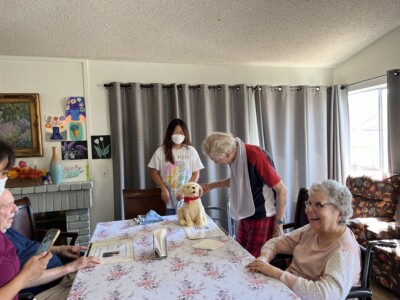Alzheimer’s Orange County (AlzOC) recently had the opportunity to ask local teenager and AlzOC volunteer, Lindsey Ko to talk about Alzheimer’s disease, how it affects families, and her personal connection to the disease.
What inspired you to help people living with dementia?
Seeing the effects of Alzheimer’s impact my great–uncle firsthand was really eye–opening for me. Although I don’t see him that often, I still recall how confusing and scary it was for me at first that he couldn’t remember me. Over time, my desire to do something, to make some kind of impact, grew as I realized that I wasn’t the only person experiencing these emotions and that my great uncle wasn’t the only person being affected. Thus, I want to help people with dementia so that they know that they have a community that they can rely on during their times of hardship.
I have visited several care homes and AlzOC’s adult day centers, where I engaged in meaningful conversations with the seniors and offered a listening ear to those who wanted to share their life stories. During my visits, I also introduced the seniors to robotic dogs that were specificallydesigned to be realistic companions for older adults facing social isolation and/or cognitive decline. I donated these robotic dogs to each of the locations I visited and hope to continue to make a positive impact on seniors with Alzheimer’s in my community.
Alzheimer’s is often described as a family disease. Do you agree?
I definitely agree that Alzheimer’s is a family disease because there are repercussions that extend all the way to the relatives of the impacted individual. Having a family member with Alzheimer’s disease, especially if they were just diagnosed, can be really overwhelming and intimidating for the entire family because of the sudden heavy responsibility that is being placed on you. At first, it can be really disheartening because you’re constantly seeing your loved one struggling to fight this disease, and it seems like you can’t do anything. However, because it is a disease that affects the entire family, I think it’s really important to remember that it can be and should be fought against as a unified group effort.
Before your loved one had Alzheimer’s, what was your perception of Alzheimer’s or dementia in general? How has it changed since then?
Before my great-uncle was diagnosed, I didn’t really know much about Alzheimer’s disease other than that it made people more forgetful and lose their memories. Since then, I’ve taken time to research the disease in more depth and learned that there are so many more complexities to the disease than just memory loss. It also involves loss of function to do basic tasks and the ability to communicate with others, and unfortunately, there is no cure. Seeing the disease firsthand has made me realize how real Alzheimer’s really is and opened up my eyes to the hidden struggle that so many are facing worldwide. I now view Alzheimer’s disease as a wall that families, scientists, and others in our community must work together to break down.
Please complete the sentence. Being a teenager with a loved one with Alzheimer’s is…
Challenging, but those challenges also motivate you to take action in order to address the struggles of the loved one and help others who are facing the same situation.
What would you like others—including other people your age—to know about the disease? What can they do to help?
I wish others would know that although Alzheimer’s disease does impact the actions of the affected individual, it doesn’t make them any less of who they are. A person with Alzheimer’s disease is still a person, and they deserve the same interactions, respect, and empathy as someone without the disease. To help people with Alzheimer’s disease, I encourage people to reach out to a nearby Alzheimer’s organization and care home to see what they can do. There’s a wide range of things that can be helpful, such as participating in Alzheimer’s walks, volunteering, writing cards, donating, etc.
Why do you think organizations like Alzheimer’s Orange County are important to our community?
I have been following AlzOC since I was a freshman in high school. Seeing all of the events and programs that organizations like AlzOC hold for impacted seniors in our community has shown me how significant these things can be for individuals with Alzheimer’s. These events really convey to the affected person and their family that they are not alone, and that there are resources available to them that they should take advantage of. Additionally, providing a safe space and means of community is really important for Alzheimer’s patients who are at a higher risk of becoming isolated. Organizations like AlzOC help provide that much-needed community.
Did you know?
The number of people with Alzheimer’s disease is projected to grow 127% between 2019 – 2040 in California’s most populous counties including Orange County.
Do you have any tips or general advice that helped you or your family?
I would say the biggest thing that helped my family was making sure that we didn’t let Alzheimer’s impact how we spent time with our loved one and hinder our relationship with him. We still visited my great-uncle as we normally would but just made sure to keep his symptoms in mind. I think that keeping a patient mindset and being empathetic can help ensure that you can have the best interactions with your affected loved one as possible.
November is National Alzheimer’s Awareness Month and National Family Caregiver Month.
Help us commemorate and raise awareness during National Alzheimer’s Awareness Month and National Family Caregiver Month by sharing information and resources like this article to spread the word. If you’re interested in sharing your caregiver or Alzheimer’s story, please email us at marketing@alzoc.org. If you or someone you know is affected by dementia, contact us at 844-373-4400 for personal, expert guidance.


